I spend lots of time occupied with find out how to be taught extra effectively. Given the identical period of time and assets, how can we be taught extra?
Whereas effectivity is helpful, focusing an excessive amount of on it might lead us to neglect the extra necessary issue for studying success: the amount of time spent studying.
Take into account an exercise like utilizing flashcards to be taught vocabulary in a brand new language. Specializing in effectivity, you’d strive to determine the easiest way to be taught every card. Do you have to research remoted phrases or embed each in a sentence? One card or a number of per time period? Use footage or solely phrases?
These are good inquiries to ask, however the beneficial properties from extra environment friendly flashcards are dwarfed by the extra necessary query of what number of playing cards you research.
Whereas studying Mandarin Chinese language, I set a goal to do 100 new flashcards per day, plus opinions. I had a number of playing cards per phrase, however this method meant I might add twenty to fifty new phrases to my vocabulary every day, which made it doable to stand up to a conversational degree extra rapidly throughout my brief keep in China.
This more-is-better method isn’t restricted to flashcards. The worth of accelerating throughput for studying is clear in every single place:
- What number of books you learn per yr (vs. attempting to learn the “proper” books).
- What number of essays you publish.
- What number of apply exams you full.
- What number of instances you rehearse a music.
- What number of coding puzzles you remedy.
- What number of minutes of dialog you’ve in one other language.
Effectivity takes the time accessible as fastened and assumes the easiest way to enhance your studying final result is by looking for the simplest methodology. Throughput, in distinction, fixes the strategy and asks: how can I be taught extra?
Whereas I usually fixate on studying effectivity, at present, I’d like to think about some methods we will enhance studying throughput.
1. Schedule massive chunks of uninterrupted time.
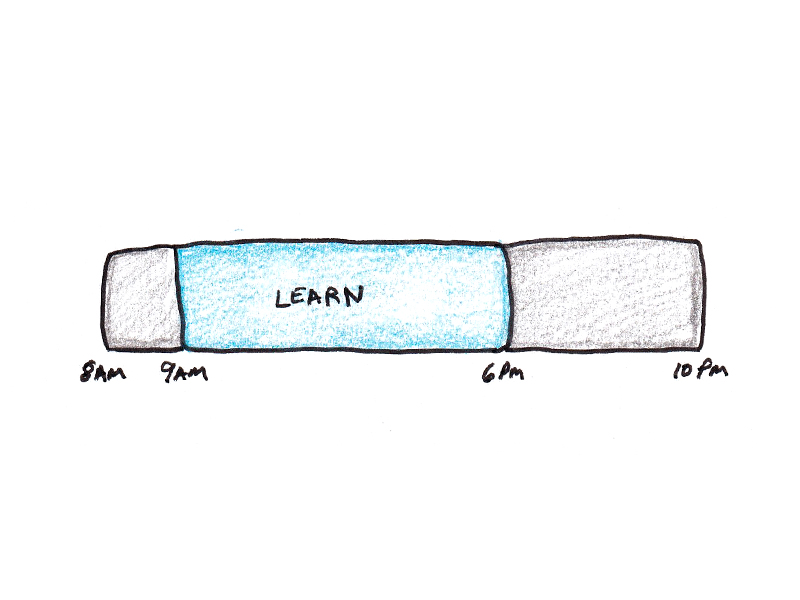
One of the best methodology for doing lots of one thing is to place it in your calendar. When you’re reluctant to place it on the calendar, you’ll be doubly reluctant to truly do the work.
This issue is a much bigger “secret” of my studying success than I usually talk about explicitly. After I did the MIT Problem, I wrote loads about my ideas on environment friendly learning—however I used to be additionally learning 10-11 hours per day with minimal breaks.
Equally, whereas Vat and my No English Rule was a helpful approach for immersive language studying, studying the language was our full-time job. I devoted a number of hours a day in China simply to learning the language, and that was on prime of all of the incidental utilization whereas touring within the nation.
I take into consideration this as a result of I sometimes get questions asking how somebody might replicate certainly one of my tasks whereas additionally working a full-time job. The implicit assumption appears to be that working full-time on one thing else wouldn’t forestall them from in any other case hitting the identical timetable. I all the time struggled to know that perspective, nevertheless it is sensible in case you don’t notice how a lot work was concerned behind the scenes.
Scheduling enormous chunks of time for tasks that aren’t central to my work or household life isn’t straightforward for me as of late, however when a mission calls for it, I nonetheless schedule it first. I learn over 100 books and greater than 600 scientific papers for my new ebook, Get Higher at Something. I did this primarily by sitting down and studying all day for months and months.
2. Be aggressive about utilizing fragmented time.
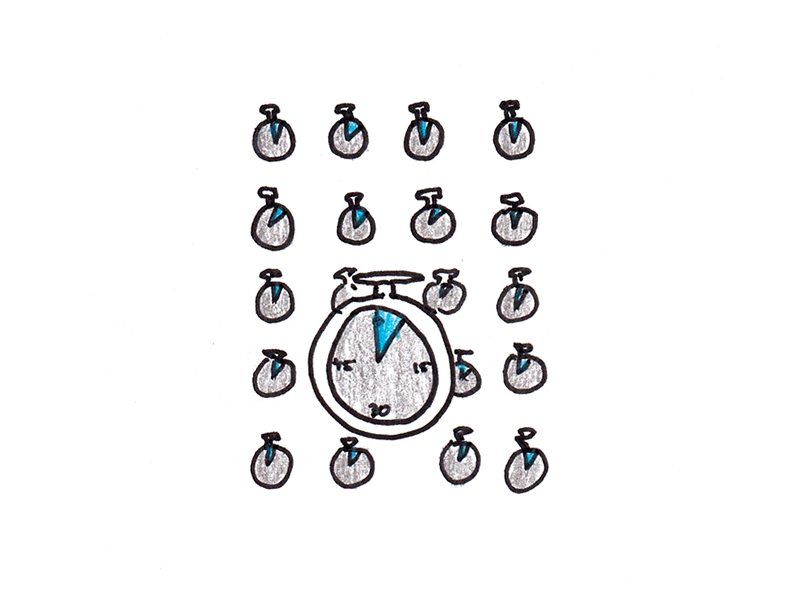
What are you able to do in case your large chunks of time are already scheduled?
The following step is to utilize your unscheduled time. There are two main methods you are able to do that:
1) Swap your telephone actions for one thing else.

Being on a smartphone (or different machine) consumes lots of our time, usually when there aren’t straightforward alternative actions. We examine our telephones whereas ready in line on the retailer, when a good friend leaves the restaurant desk to make use of the lavatory, when sitting on the bus for our commute. That point isn’t normally allocable to the deep studying actions I discussed within the first level, nevertheless it’s not fully ineffective both.
Determining what you are able to do with that point—and being disciplined about utilizing it—can add as much as a giant distinction. Earlier than Vat and my journey to China, I put in nearly 100 hours studying Chinese language, regardless of solely scheduling a couple of dozen hours of precise learning time. Most of my apply got here from utilizing time fragments to check my flashcards.
Equally, having the Kindle app in your telephone can drastically enhance the variety of books you learn, and downloading lectures to observe later in your telephone can enhance the variety of classes you view.
Usually, the principle impediment to reaching that is all the opposite issues in your telephone. If in case you have X (previously Twitter) or Instagram, you’re not going to evaluation flashcards. Thus, the easiest way you possibly can plan out your time right here is to cull any distracting apps in order that the one issues you are able to do along with your telephone to kill time are the stuff you really care about.
2) Make tasks and actions able to go.
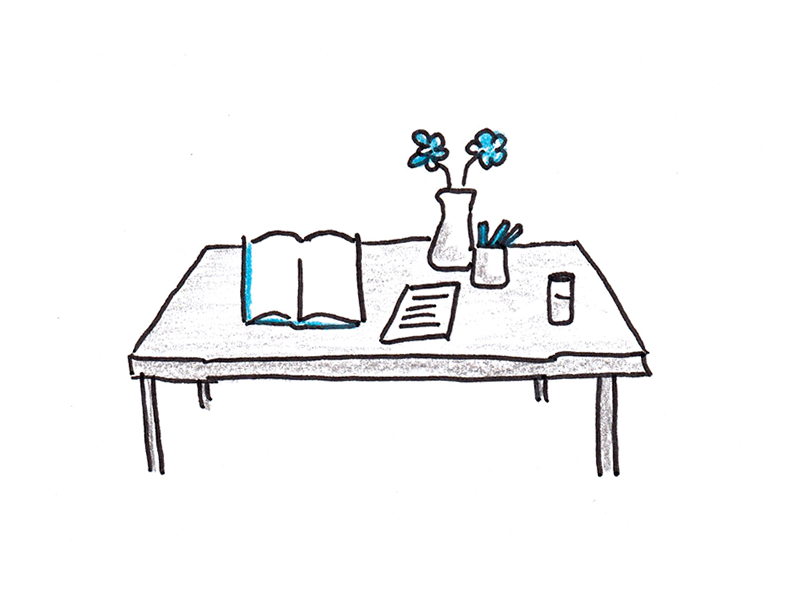
The opposite time fragments we will reclaim are intervals of downtime through the day after we could possibly be studying however aren’t inclined to. These are the instances after we might watch Netflix, however might additionally learn or apply programming or drawing.
The impediment right here is normally that the tasks we’d interact in have excessive energetic or logicstical prices to getting began. As soon as you’re into the mission, the training job is usually pleasing sufficient to encourage you to maintain going. However in case you can’t recover from that preliminary bump, particularly in case you’re drained on the finish of the day, you’ll find yourself investing loads much less time.
You may repair this by making your actions able to go. Having a devoted house in my residence for artwork tasks has made it loads simpler to maintain engaged on them (in comparison with after I needed to arrange and put all the things away for every session). Equally, I prefer to maintain programming mission home windows open repeatedly after I’m engaged on a mission, so all that’s required is a click on to the working space. Lastly, conserving lecture movies paused wherever you left off saves you from having to seek out the video—and the place you left off—once more. This stuff could sound trivial, however they will add vastly to how a lot you do.
I ought to be aware that my private coverage is to keep away from this technique for tasks which are already closely scheduled. When you’re already placing in a number of hours of deliberate learning, it’s finest not additionally to suggest that you might research at any time when you’ve free time, as that tends to suck away vitality out of your precise schedule.
3. Make every iteration extra environment friendly.

In an industrial context, a giant a part of rising throughput is eliminating even trivial quantities of waste that happen on every assembled merchandise. One among Henry Ford’s nice insights was to modify the method from staff transferring between automobiles, assembling every half, to having the automobiles transfer to every employee—the conveyor belt of the meeting line minimized the period of time staff spent strolling round.
Equally, there are sometimes steps you possibly can take to cut back the inefficient, non-learning elements of your studying course of.
Take into account:
- Time spent selecting supplies. This could possibly be selecting what to attract, which phrases to memorize, which books or articles to learn, or which apply issues to unravel. A major supply of wasted time is solely deciding what to be taught subsequent. When you arrange a queue and fill it with supplies, you possibly can keep away from this sort of waste.
- Time spent idling inside duties. An underpainting must dry earlier than you possibly can contact it up. A machine studying mannequin must be educated earlier than you possibly can debug it. You will need to wait your flip to ask the professor a query. You may get rid of these gaps with concurrent duties or, if that’s not possible, another exercise that enhances what you’re engaged on (say, switching from working towards to studying).
- Time spent getting ready supplies. Creating flashcards, organizing your notes, downloading a developer surroundings, and printing off studying materials are all a part of the job of studying, however they don’t contain any lively pondering that results in studying. You may optimize these by batching comparable duties collectively, creating templates for future work and even ignoring the duty fully (for example, I used to print papers to learn them; now I do all the things on my laptop to avoid wasting time).
An necessary caveat right here is that whereas we wish to make our studying cycles extra environment friendly, we received’t do this by shortcutting the training course of. Memorizing an answer you don’t perceive, dashing by way of a course of rapidly and carelessly when your purpose is accuracy, or utilizing supplies with errors with out taking the time to repair them can decrease your studying throughput, whilst you superficially speed up the tempo.
4. Make studying extra pleasing.
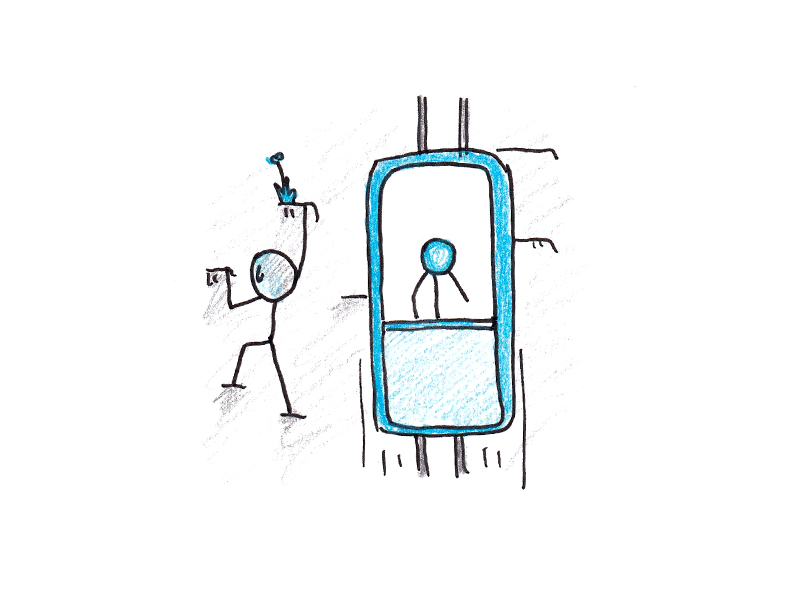
There’s a fundamental connection between enjoyable and throughput: It’s simpler to encourage your self to do pleasing duties than those who really feel grinding or boring. Since motivation, not time, is most frequently what’s in brief provide, making studying extra enjoyable can routinely enhance involvement.
I’ve written a separate essay on find out how to make studying extra enjoyable with out sacrificing effectivity. Briefly, optimizing problem for a excessive success price, discovering methods to make the topic extra significant, and rewarding your self incessantly are all methods to make an exercise pleasurable sufficient that it doesn’t require extreme self-discipline to execute.
5. Determine what you’ll do much less of, to be able to be taught extra.
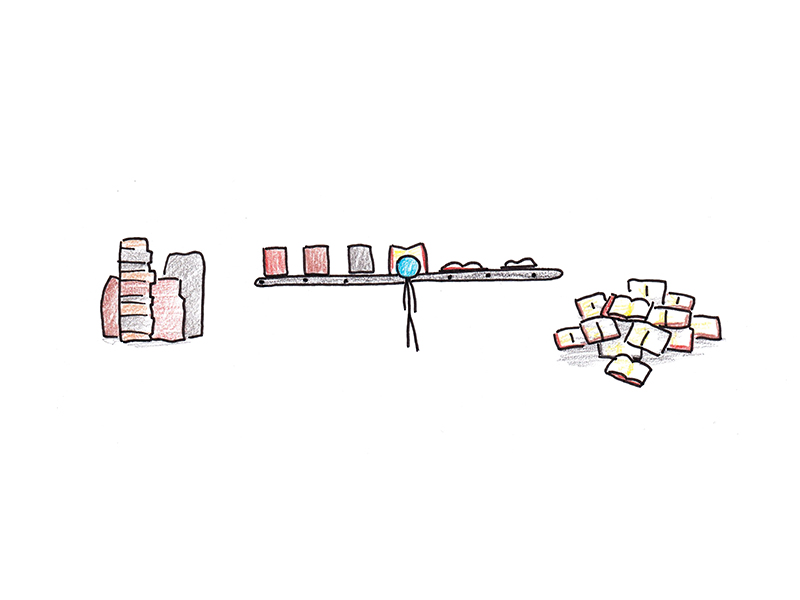
Discussing trade-offs between totally different, worthwhile actions is taboo in self-improvement recommendation. The implication is that you need to be exercising, socializing, meditating, journaling, hustling, touring, spending high quality time with your loved ones and ingesting sixteen glasses of water daily.
Besides that’s not possible. You may’t really do all the things, and the individuals who seem like doing all the things normally aren’t both.
As a substitute, the choice to be taught extra is all the time a call to do much less of one thing else. Whereas generally this trade-off doesn’t trigger significant worth conflicts (I don’t miss social media in any respect, for example), that’s not all the time the case. The choice to spend extra time studying books, for instance, may imply much less time spent following the information. Or the choice to be taught a language may imply there aren’t thirty minutes in your day for meditation.
Generally the trade-off is between the stuff you intend to be taught. After having youngsters, I intentionally selected to cease scheduling common dialog apply for the languages I had discovered. I felt dangerous about it, partly as a result of sustaining a conversational degree in these languages was necessary to me. Nonetheless, if I insisted on scheduling a number of hours every week to keep up my prior studying tasks, I might forestall myself from studying different issues, which I worth extra.
The necessity to settle for trade-offs is one motive I like studying tasks with outlined timelines, somewhat than habits that proceed indefinitely. It’s simpler to decide to working in your French, JavaScript or public talking abilities if the timeframe is 4 months somewhat than a perpetual dedication.
Nonetheless, I believe extra of us could be higher off if we make these trade-offs express, somewhat than making them thoughtlessly and feeling responsible about it afterward.
These are my solutions—what are yours? What do you do to maximise the quantity of studying in your life? Share your ideas within the feedback!

